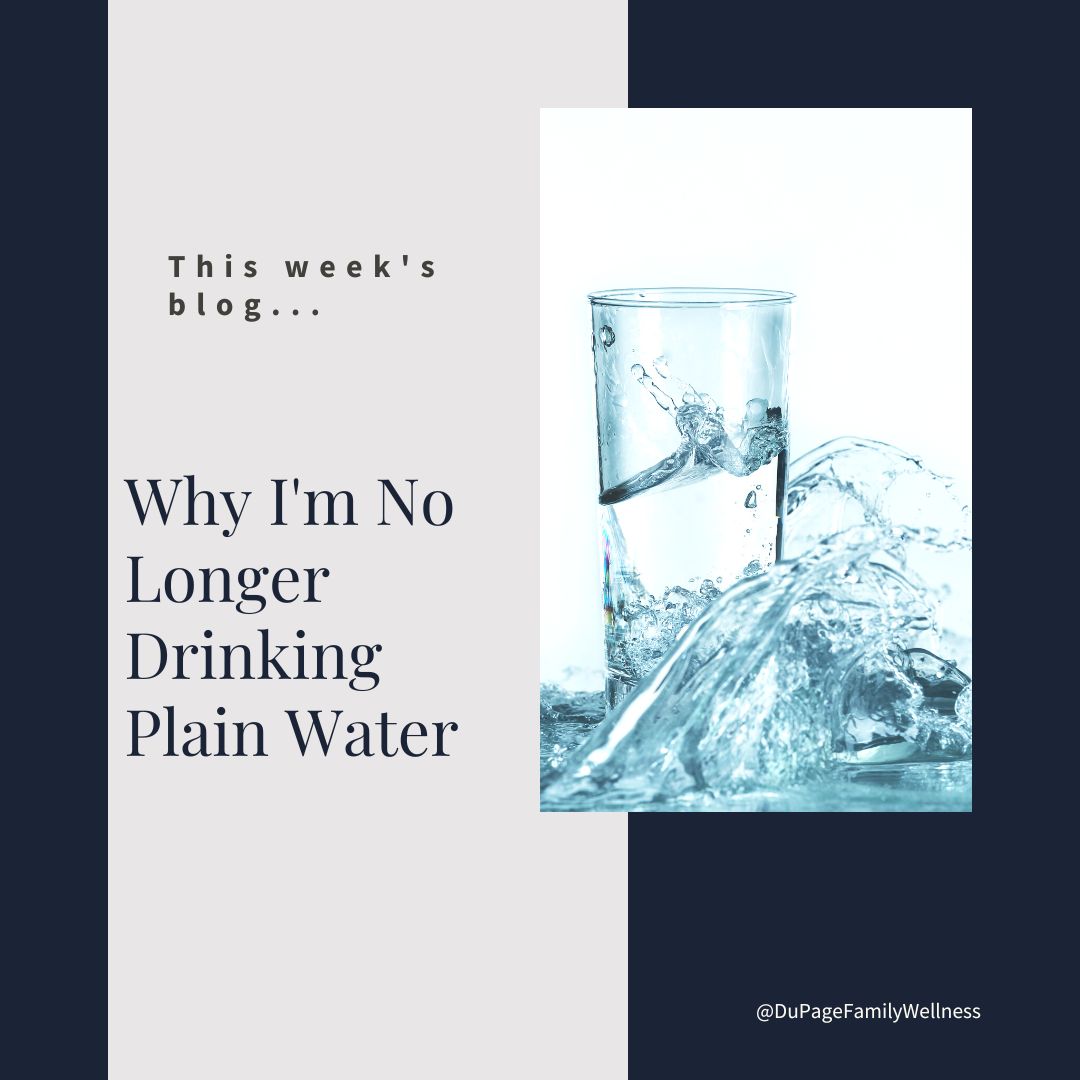 Yes, it's true. I no longer drink plain water... and yet I am the most hydrated that I've been in my life.
Yes, it's true. I no longer drink plain water... and yet I am the most hydrated that I've been in my life.
We have been told for years that in order to stay hydrated, you must drink 8 glasses of water a day. I myself am guilty of telling people to drink "one ounce of water for very 2 lbs. of body weight." Unfortunately, what you often aren't getting from this water is minerals!
Yes, you need water, but you also need all sorts of minerals. Your current water processing and filtering systems have probably stripped away most of those minerals from your water. Think about the fluids in your body. They aren't made up of straight H2O. You have a complex mixture of all sorts of minerals.
If you are drinking just plain water (especially if you have a lot of it), you can dilute those mineral-rich fluids in your body. This makes your kidneys work way harder than they need to, and you may find yourself running to the bathroom constantly to pee off all of that excess fluid.
Adrenal Cocktails
This summer I started utilizing something called an Adrenal Cocktail. After running a Hair Trace Mineral Analysis (HTMA) test on myself, I found out that my potassium levels were incredibly low and was inspired to start utilizing adrenal cocktails.
There are several ways to make an Adrenal Cocktail, a mineral-rich drink that particularly focuses on supporting sodium and potassium levels. It also contains Vitamin C which helps in the utilization of these vitamins and provides bio-available copper.
My Adrenal Cocktail consists of:
- 1 Cup Coconut water
- Juice of 1 lime
- 1/4 tsp salt
That's it! I mix it up in the morning and take it with me to work every day. I sip on it between breakfast & lunch and between lunch & dinner.
In addition to feeling like I am actually doing a better job of staying hydrated, I have also noticed improvement in my skin and my energy! Here are more Adrenal Cocktail Recipes.
What else do I drink? Gel Water
Another way to increase hydration in the body is through a substance called "Gel Water." In their book Quench, authors Cohen and Bria describe Gel Water, or living water, as a “newly identified phase of water that’s not quite liquid, vapor, or ice. (It is) identified by an extra hydrogen and oxygen atom, so the molecular structure is H3O2.”
Read more ...
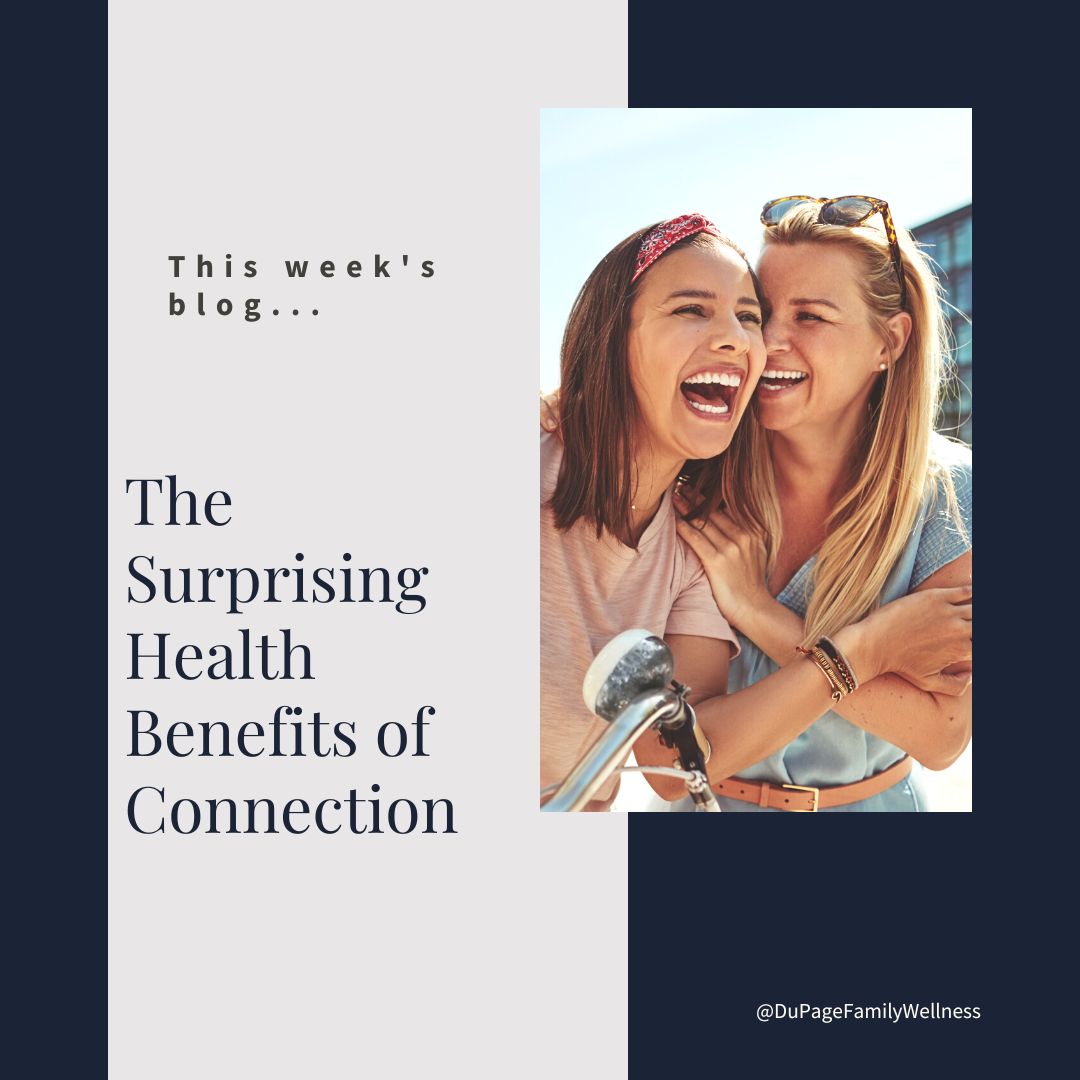 What comes to mind when you talk about healthy habits? Many people think about eating nutritious food, getting adequate movement, staying away from cigarettes, limiting alcohol, and possibly lowering stress levels.
What comes to mind when you talk about healthy habits? Many people think about eating nutritious food, getting adequate movement, staying away from cigarettes, limiting alcohol, and possibly lowering stress levels.
These are all important habits, but there is one habit that most people simply are not aware of. It might surprise you, but “enjoying social connections” is an important health habit!
Research is showing that social connections have a major impact on both our mental and physical health. While the impact of social connections on emotional wellbeing may be expected, the extensive impact on physical health may come as a surprise.
Let’s take a look at this dynamic so that you can lean into the benefits of social connections.
Social Connections Impact of Physical Health
The American Association for the Advancement of Science published a study that found “a lack of social connection is a greater detriment to health than obesity, smoking and high blood pressure.”
A lack of social connections has also been linked to inflammation and hypertension. It may be shocking, but strong social connections actually improve your immune system and lead to a 50% increased chance of longevity. The benefits are surprising, but true.
More research is needed to discover why social connections have such a dramatic impact on health, but the research is clear that social connections are extremely important if you want to live a long and healthy life.
What’s at the Core of Social Connection
So, what does it mean to be socially connected? Researcher and author Brene Brown defines connection “as the energy that exists between people when they feel seen, heard, and valued; when they can give and receive without judgment; and when they derive sustenance and strength from the relationship.”
Feeling seen, heard, and understood is enough to feel connected to another person weather near or far. Some people find it easier to build connections with people who live locally. Getting together for dinner, coffee, a game, or a walk can be fun ways to build relationships with those around you.
Connections, however, can be built from a distance as well. It may take a little more work to connect with friends who you don’t see regularly, but these relationships can be cultivated through phone calls, a text, zoom calls, emails, and even an old fashion letter.
Read more ...
 What if I told you that the foundation to being fit and strong was so easy a baby could do it? It would be hard to believe, but it's true. And babies everywhere are doing it!
What if I told you that the foundation to being fit and strong was so easy a baby could do it? It would be hard to believe, but it's true. And babies everywhere are doing it!
There are no baby exercise classes. Most babies learn how to move on their own. They tend to progress through movement the same way. They lift their head, rollover, crawl, and eventually start toddling around.
We typically don’t think about all that goes into their development, but it is amazing. If we look closely there is a lot we can learn from these little ones.
Let’s see what we can learn about movement through the amazing process these little ones go through as they develop their ability to move.
Functional Movement
Research has found that the way a baby moves is the most efficient way to move. But our modern world has taught us to move in ways that are unnatural. Many of us sit at our desks all day using a keyboard. We walk on treadmills instead of going for a walk.
But when we deviate from this type of movement we will not function at our best. It can lead to all sorts of pain in the body and restrict our movement. But there is a way to reestablish proper movement.
Functional Progression exercises are modeled after babies and how they move, organize movement patterns, and learn to stabilize. They allow us to reestablish movement patterns so that they become natural again.
Where to Begin - Diaphragmatic Breathing
Breathing properly is a foundational piece of movement, but most adults do not breathe in a natural way. In fact, a pilot study of 96 people in 2003 that assessed breathing mechanics found that only 25% of people breathe properly.
Using the wrong muscles to breathe can lead to a host of problems such as recurrent chronic fatigue, anxiety, panic attacks, as well as many musculoskeletal symptoms. But these things can be helped by learning to breathe like a baby again.
If you are trying to make changes in the way that you breathe, it will take some time. But you can do it if you try to focus on your breathing technique at least once an hour.
This video will show you what you should be doing to breathe properly. Remember, this is the foundation for all the other functional movement exercises, so don’t skip this important step.
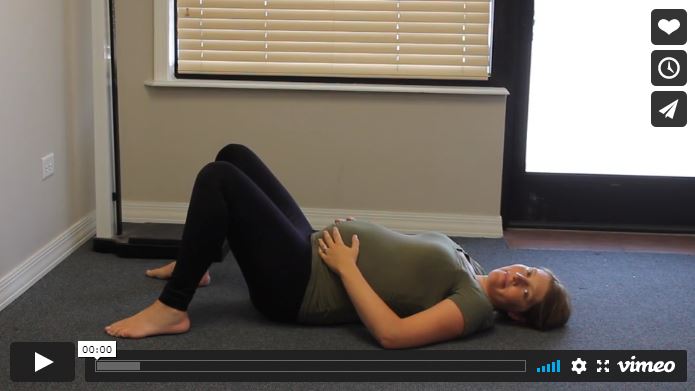
The Dead Bug
While you are learning to breathe properly again, you can also begin to engage your core in a specialized way.
Take a moment to think about a baby laying on its back. Where are his legs? Where are her hands? They are in the air moving about. It’s not a complicated or rigid movement, but it does engage the core in an important way.
The functional movement exercise that teaches you this is called the “dead bug.” It mimics that type of movement a baby makes naturally.

I am passionate about leading you to greater health! If you are interested in learning more about Functional Progression or would like to work with me to learn these movements give us a call 630-448-0255 to set up an appointment.
Dr. Jamie
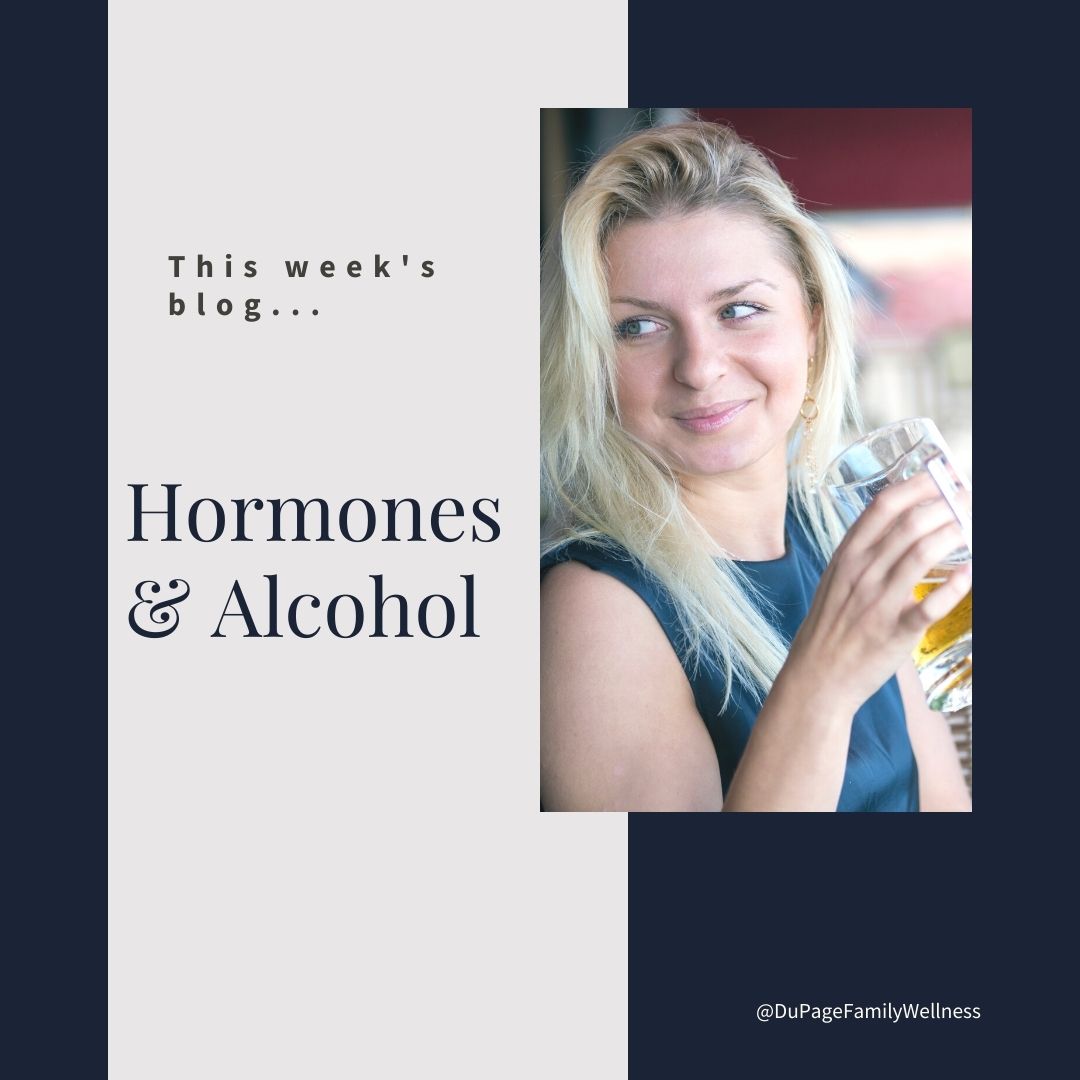 In the summer you may have visions of lounging by the pool with a drink in hand. While that isn’t always an option, a beer or glass of wine at the end of the day certainly is.
In the summer you may have visions of lounging by the pool with a drink in hand. While that isn’t always an option, a beer or glass of wine at the end of the day certainly is.
There is nothing wrong with an occasional drink. It can be a nice way to wind down or have fun with your friends.
At the same time, it’s good to understand the effects it has on our bodies. Once we do, we can make wise decisions on what and how much we drink.
Let’s take a look specifically at how it affects women in regard to our hormones.
What Are Hormones?
Hormones are chemical messengers within the body that are secreted by glands in the endocrine system. These messengers tell the tissue and organs in the body what to do.
The proper balance of hormones is crucial for both physical and mental health. When something happens to make one hormone increase the other hormones are affected.
It's like a delicate dance with some hormones following another's lead.
Alcohol and Hormones?
Alcohol has a complicated relationship with the balance of hormones within the body. It increases some hormone levels, which inversely lowers other hormone levels.
Let’s take a look at some of the specific ways moderate alcohol impacts this system.
- Estrogen - Alcohol has been found to raise the level of estrogen in the body. One of the reasons is because both alcohol and estrogen are processed in the liver. When the liver is busy handling alcohol, it prevents the liver from detoxing estrogen as efficiently. This results in a buildup of estrogen in the system.
- Cortisol - Moderate alcohol increases this stress hormone while suppressing the amount of melatonin the body produces by up to 20%. While you may expect alcohol to relax you and give you a good night’s sleep, research says that the opposite actually happens.
- Thyroid Hormones - The rise in estrogen we spoke about earlier prevents the thyroid from releasing the normal amount of hormones. In addition, the increase in stress hormones will make your body less effective in converting T4 into T3.
- Progesterone - Estrogen and progesterone have an inverse relationship. When estrogen levels rise due to alcohol consumption, progesterone will decrease.
- Insulin - Alcohol may hinder the body’s ability to process sugar in some people and increase issues with insulin resistance.
Implications for Women
When we understand the impact that alcohol has one our system, we can use this knowledge to make decisions about our alcohol consumption.
Consider your body and season of life. If you are already dealing with Polycystic Ovary Syndrome (PCOS) or other hormonal issues, you may choose to be more cautious with your alcohol intake than someone who is not struggling with it.
Another group that may choose caution, are women trying to conceive. Since proper hormone balance is crucial for conception, women with fertility issues may wish to limit their alcohol consumption especially during the week leading up to ovulation.
Please know that I am not saying alcohol is bad! It is a personal decision, and you won’t find any judgment here. I just want to present this knowledge to you so you can make an informed decision surrounding your alcohol intake.
Dr. Jamie
 Have you ever thought about how our ancestors long ago lived compared to how we live today? And how our modern conveniences have changed the world we live in and what that means for you?
Have you ever thought about how our ancestors long ago lived compared to how we live today? And how our modern conveniences have changed the world we live in and what that means for you?
When you stop to think about it, the differences are drastic. We don’t move, eat, or sleep the same as people did thousands of years ago. Even our grandparents had a different life than those thousands of years ago, though they were much closer than we are today.
Let’s look at the impact that our current culture and environment have on our health and see what we can do to honor what our bodies have always needed.
Food, Movement, & Sleep for Our Ancestors
Thousands of years ago our ancestors were dependent on the land. They didn’t have any other source of food than that which they could provide for themselves.
As hunters and gatherers, they needed to move much of the time. They walked many miles to chase prey. They spent a lot of time gathering food from plant sources - berries, roots, etc. - but oftentimes food was scarce.
Even when they relaxed, they had to physically support their bodies, sitting on the ground or a bench made of logs. In general, movement didn’t need to be an intentional decision, it was simply built into their everyday life.
Our ancestors also tended to follow the rhythm of the sun. Since their light was limited to the sun, stars, and possibly a fire, they likely did not stay up to all hours of the night. Bright light in the morning and darkness at night supported a healthy circadian rhythm.
Read more ...
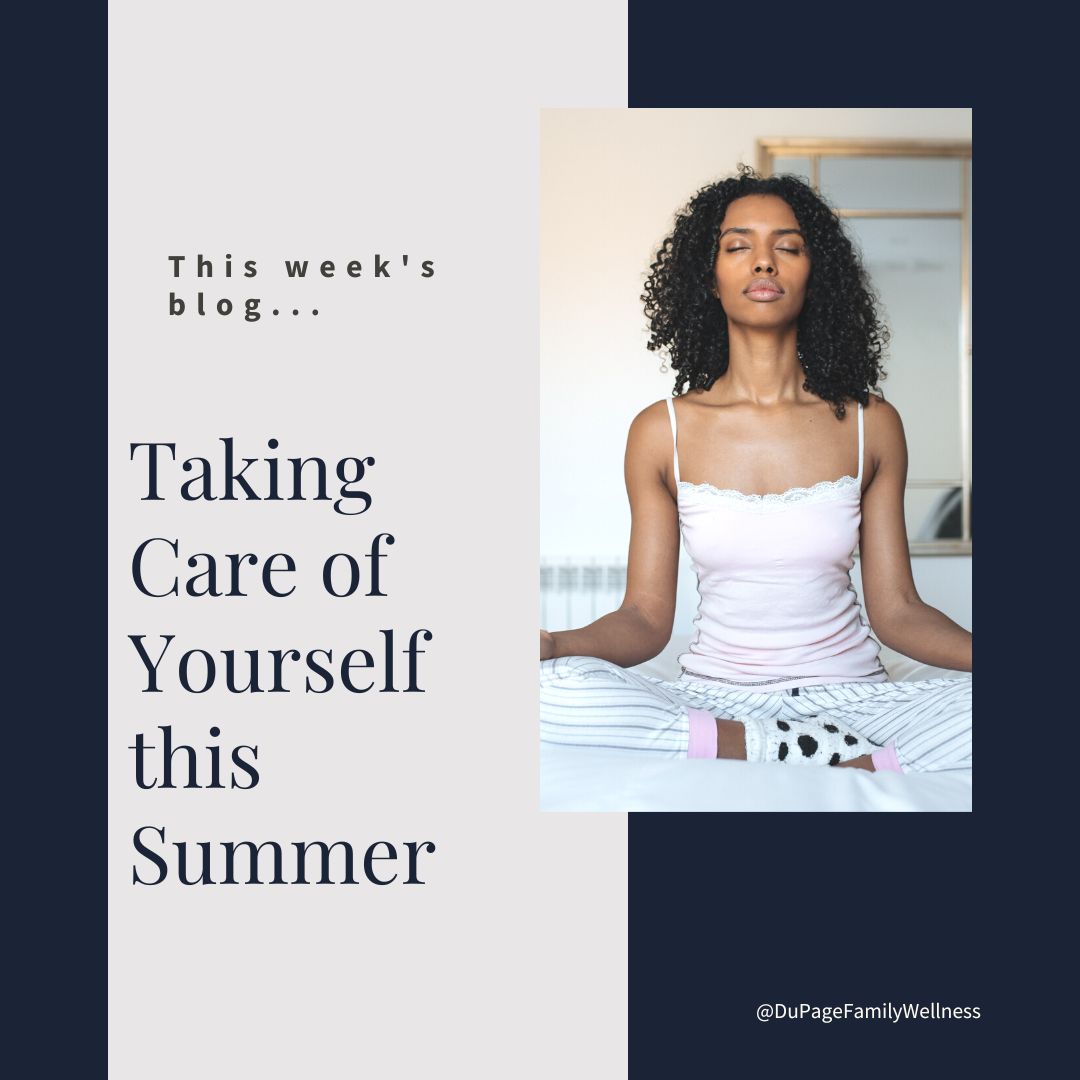 What have you been doing to take care of yourself this summer? Whether the kids are home or work is in full swing (or both), it’s important to take time for yourself!
What have you been doing to take care of yourself this summer? Whether the kids are home or work is in full swing (or both), it’s important to take time for yourself!
This doesn’t have to take long or cost a lot of money. Some self-care techniques only take five minutes are completely free. While it’s nice to take vacations or do spa days, these little things may be more practical.
So, take time now to look at our biggest tips for taking care of yourself, and make a plan for your summer!
Grounding
Grounding is bringing your awareness to the present moment. This is done through awareness of your body and surroundings. Since most of our worry is about things in the past or things yet to come, this is extremely helpful in dealing with stress.
Simply closing your eyes and paying attention to your breath brings you back to the present moment. Intentionally looking at things in your surroundings or noticing sensory input can be effective as well. The key is the intention and awareness of the action.
For more directed grounding exercise check out the following.
Social Connection
Meaningful social connections are good for your mental and physical health. Positive connections lead to the activation of the parasympathetic nervous system. This is often referred to as co-regulation of the nervous system.
So, connect with a friend...
- in person if you are able
- with a video call so you can be face-to-face.
- through a phone call.
- by email and text.
Read more ...
 Yes, it's true. I no longer drink plain water... and yet I am the most hydrated that I've been in my life.
Yes, it's true. I no longer drink plain water... and yet I am the most hydrated that I've been in my life. 

 What comes to mind when you talk about healthy habits? Many people think about eating nutritious food, getting adequate movement, staying away from cigarettes, limiting alcohol, and possibly lowering stress levels.
What comes to mind when you talk about healthy habits? Many people think about eating nutritious food, getting adequate movement, staying away from cigarettes, limiting alcohol, and possibly lowering stress levels.  What if I told you that the foundation to being fit and strong was so easy a baby could do it? It would be hard to believe, but it's true. And babies everywhere are doing it!
What if I told you that the foundation to being fit and strong was so easy a baby could do it? It would be hard to believe, but it's true. And babies everywhere are doing it!  In the summer you may have visions of lounging by the pool with a drink in hand. While that isn’t always an option, a beer or glass of wine at the end of the day certainly is.
In the summer you may have visions of lounging by the pool with a drink in hand. While that isn’t always an option, a beer or glass of wine at the end of the day certainly is. Have you ever thought about how our ancestors long ago lived compared to how we live today? And how our modern conveniences have changed the world we live in and what that means for you?
Have you ever thought about how our ancestors long ago lived compared to how we live today? And how our modern conveniences have changed the world we live in and what that means for you? What have you been doing to take care of yourself this summer? Whether the kids are home or work is in full swing (or both), it’s important to take time for yourself!
What have you been doing to take care of yourself this summer? Whether the kids are home or work is in full swing (or both), it’s important to take time for yourself!